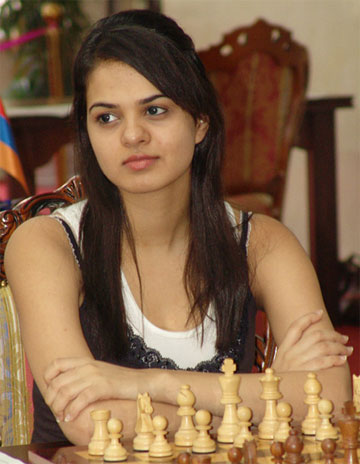 New Delhi, September 18: Grandmaster Abhijeet Gupta and International Master Tania Sachdev are at cloud nine after winning the silver and bronze medal respectively at the Chess Olympiad recently but they rued the lack of government recognition for their performance at the prestigious event.
New Delhi, September 18: Grandmaster Abhijeet Gupta and International Master Tania Sachdev are at cloud nine after winning the silver and bronze medal respectively at the Chess Olympiad recently but they rued the lack of government recognition for their performance at the prestigious event.
Abhijeet won the silver after pocketing seven points out of nine games while Tania turned out to be the best woman performer for India with a bronze medal as the women team dished out its best-ever performance with a fourth-place finish in Istanbul.
"It was a dream come true for me to win the silver in my first Olympiad. I was anxious going into the tournament but I worked extremely hard for the event. It was a good experience to play alongside the top players," Abhijeet told reporters.
"But I would have been happier if the team would have done as well. We had our chances but we conceded too many draws.”
"I`m a bit disappointed with the government. I mean I at least expected a call after my performance at Istanbul. They have done a lot but they need to do more to recognise the efforts of the chess players," he said.
Tania said: "It was a great tournament. I was always confident of doing well. I wanted to do well. Last one year was not so good for me but it was a historical event to finish fourth out of so many teams. It is a great achievement."
Asked if she was happy with the government`s effort, Tania said: "The support by government has improved but it is still not equal to the amount of sacrifice and hard work that a chess player puts in. It still has to go a long way."
Asked about his best game in the tournament, Abhijeet said: "It was the match against Georgia. It was a good game as I hung in there even in difficult times to eventually beat Sanikidze.
The Bhilwara-based Abhijeet is currently ranked 100 in the FIDE and he said he wants to crack the top 50 by this year end.
"The last two years were okay for me and after this tournament, I hope to reach top 80-85. I`m playing the Baku Open in a few days` time and then I will go for training in Belgium. But I want to break into the top 50 by December," he said.
The 26-year-old Tania from Delhi also has her sight on the coming tournaments and said her next target is to become the world champion.
"I have the nationals next and then I will play in the Snowdrops versus Old Hands in Prague. I have been invited for that and I am looking forward to that. But my target remains the world championship. I really want to win that title," she said.
Meanwhile, All India Chess Federation (AICF) secretary Bharat Singh, made it clear that they won`t take any action against top players Viswanathan Anand and Koneru Humpy for skipping the chess Olympiad.
"AICF won`t take any action against any player. We don`t believe in that, we rather produce our own championships and we have done and shown that," Singh said.





Comments
Add new comment